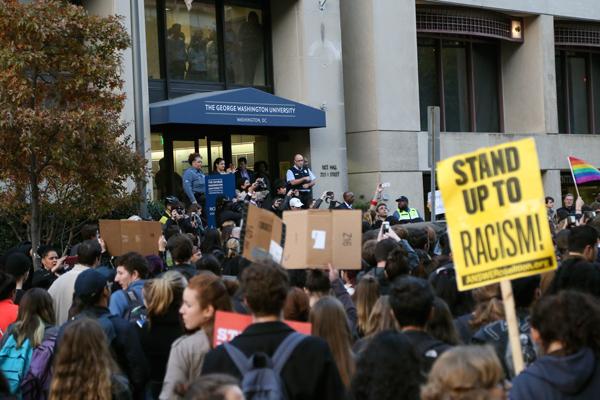Two weeks after the presidential election, international students on campus and nationwide are concerned about how some of President-elect Donald Trump’s proposed policies could create an unsafe situation for them on campus or prevent them from attending college in the U.S. at all.
And while experts say higher education officials across the country should consider the implications of a Trump presidency as they plan global recruitment strategies, these fears ring especially true at GW, where officials are trying to grow international student enrollment. Foreign students are valuable resources – both academically and financially – because they bring new perspectives and talents, contribute to research and in many cases, pay full tuition.
Trump’s proposed policies include a ban on Muslims entering the country, stricter immigration regulations and a wall between the U.S. and Mexico – positions that have drawn both intense criticism from opponents and approval from supporters throughout his campaign.
University spokeswoman Maralee Csellar said because the undergraduate application deadline is not until January, it is too early to tell if there has been a decline in the number of international applicants.
“GW will continue to be a place that embraces and celebrates diversity,” Csellar said in an email. “While we observe as the country transitions from one presidential administration to another in the coming weeks and months, we will continue to offer support and resources to our current students and work with prospective students as individual questions arise during the application process.”
Csellar declined to say if any international applicants had withdrawn their applications since the election, or if administrators are talking with students to change their minds about withdrawing applications.
The University’s international enrollment has increased dramatically over the past three years, with more than 4,200 students from 130 countries now enrolled in undergraduate and graduate programs.
Student leaders, faculty and experts said they are worried that some of Trump’s proposed policies could have a negative impact on international interest in the U.S. higher education system.
In the short-term, some international and undocumented students say they fear for their safety and security in the U.S. Last week, the more than 400 students who participated in a nationwide walkout delivered a list of demands to administrators, largely focused on protecting undocumented students and establishing GW as a “sanctuary campus.”
The University currently accepts and offers merit scholarships to undocumented applicants under the Deferred Action for Childhood Arrivals policy, which allows undocumented immigrants who entered the country before their 16th birthdays and before June 2007 to receive exemption from deportation. Officials do not track the number of undocumented students at GW.
Student Association President Erika Feinman said in an interview earlier this month that SA leaders have been working with University President Steven Knapp on how to best support undocumented and other international students.
“We know that there are some very real issues that may come up for those groups in terms of whether or not they can continue their education in the U.S.,” Feinman said. “So we’ve been talking about ways to support them and also about ways to support the campus community at large because there are so many students who have a lot of different emotions and the results of the election are impacting students in so many different ways.”
Isaac Fuhrman, the associate director of the International Students Community, said that although it is too soon to see how international students will be affected by Trump’s administration, his group will work with faculty, speakers and other student organizations to host events about domestic and foreign policies that would affect international students.
Fuhrman said some of the discussed policy changes could hurt the flow of international students into the country, like a reduction in student visa availability or the elimination of Optional Practical Training, a program that lets recent graduates access temporary employment and extend their visas.
“It would be devastating for international students trying to develop a career in the U.S.,” he said.
John Banzhaf, a public interest law professor, said in the event Trump goes through with some of his proposed policies like banning Muslims from entering the country, the University may benefit financially by refocusing its international recruitment in countries like Japan, Korea, Australia and New Zealand. Those countries’ relationships with the U.S. would likely not change if such a ban were implemented, he said.
“Muslims may feel less welcome and subjected to more adverse things, therefore they might decide to study in London or somewhere else,” Banzhaf said. “They have to begin looking at dollar amounts and ought to intensify their recruitment efforts in other areas.”
Danny Leipziger, a professor of the practice of international business, said that because GW offers many internationally focused academic programs, he does not anticipate a loss of interest in the University.
“The interest in what the U.S. does is not going to change,” Leipziger said. “I don’t think it will have a direct effect on the interest in GW or Washington.”
Still, he said GW could benefit from promoting international programs, like the Elliott School of International Affairs and international business programs, to draw in students who might be on the fence about attending an institution in the U.S.
“I could see the merit of making those programs as visible as they have been in the past, the importance that GW places on exchange of people and ideas,” he said.
Experts in international education said Trump’s policies could potentially have an impact, but they do not anticipate a long-term loss in interest among students who want to study in the U.S.
Rajika Bhandari, the deputy vice president of research and evaluation at the Institute of International Education, said even through periods of isolationism, depression and wars, international students have not lost their enthusiasm for studying in the U.S. The only time that the total number of students dropped was briefly following 9/11, when specific policy changes impacted student visas, Bhandari said.
“International students are pragmatic and resilient, and they have continued to come to the United States to study in increasing numbers over time,” she said. “Students choose U.S. higher education as an investment in their future because of its high quality and diversity of opportunity, and we believe they will continue to do so.”
Rahul Choudaha, the CEO and principal researcher of DrEducation, a global higher education research and consulting firm, said the looming Trump presidency has created a negative environment at U.S. universities that currently overpowers those institutions’ appeals. He said even more than students, parents are concerned about the ways that studying in the U.S. could now hinder students’ safety, security and success.
“They still believe that they’re the best in terms of choices available, but they are not ready to take that risk to get the benefits of accessing world class universities, putting at risk the career or life or security of their child,” he said.
He said that to combat parents’ fears, the University should step up its one-on-one outreach to international families to show them the value of an international education, especially as application deadlines approach.
“There is a lot more confidence building which needs to happen,” Choudaha said. “On a positive note, the fundamentals of the American higher education system are strong, and it has resilience buried into it.”








